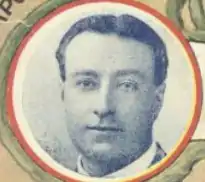Herbert De Pinna
Herbert De Pinna (1883–1936) was a composer and medical doctor. He was a medicine graduate from Cambridge University who trained at Middlesex Hospital.[1] He opened a hospital in Queensland, but claimed he made more money from music.[2][3][4]
Herbert De Pinna | |
|---|---|
 Herbert De Pinna 1914 | |
| Background information | |
| Born | January 1, 1883 Brisbane, Queensland, Australia |
| Died | January 1, 1936 (aged 53) |
| Occupation(s) | Composer |
| Years active | 1910-1936 |
Herbert De Pinna is best remembered for Broadway-style numbers written for successful pantomimes The Bunyip[5][6][7] and Robinson Crusoe,[8] which toured major Australian cities.[9] A song from the 'Bunyip was adopted by schools and enjoyed phenomenal sales [10]
De Pinna won a successful Supreme Court case for defamatory remarks made to his medical clients.[11]
During world war two, his son Arthur[12] was shot down and killed by Imperial Japanese Army Air Service over Kupang, Indonesia.[13]
Works
- Seven songs for the 1914 musical Bunyip (musical)[14]
- I Wonder
- The Parsons' Glide : two-step & one-step
- Claire : graceful dance
- Dorothy : old English dance
- Eight interesting pianoforte solos
- Devil's Picnic : for piano
- E'er Dawns Another Day
- Moonlight Surfing[15]
- All the Girls are After Me [16]
References
- "Music Directors & Composers [Industry]". Australian Variety Theatre Archive. 15 December 2011. Retrieved 28 January 2018.
- "Dr. Herbert de Pinna, Composer". Mudgee Guardian and North-western Representative. No. 2433. New South Wales, Australia. 21 June 1917. p. 18. Retrieved 18 February 2018 – via National Library of Australia.
- "A Successful Composer". Leader. New South Wales, Australia. 14 May 1914. p. 2. Retrieved 18 February 2018 – via National Library of Australia.
- "Dr. Herbert De Pinna Commencing Practice in Mudgee". Mudgee Guardian and North-western Representative. New South Wales, Australia. 26 July 1920. p. 9. Retrieved 18 February 2018 – via National Library of Australia.
- "Australian Panto Success". Leader. New South Wales, Australia. 26 January 1917. p. 8. Retrieved 18 February 2018 – via National Library of Australia.
- "Pantomime Music". The Sydney Morning Herald. No. 24, 644. New South Wales, Australia. 30 December 1916. p. 6. Retrieved 18 February 2018 – via National Library of Australia.
- "The Bunyip". The Northern Star. Vol. 41. New South Wales, Australia. 12 January 1917. p. 4. Retrieved 18 February 2018 – via National Library of Australia.
- "Robinson Crusoe Panto". Daily Herald. Vol. 9, no. 2519. South Australia. 17 April 1918. p. 6. Retrieved 18 February 2018 – via National Library of Australia.
- "Robinson Crusoe Pantomime". The Register (Adelaide). Vol. LXXXIII, no. 22, 289. South Australia. 17 April 1918. p. 9. Retrieved 18 February 2018 – via National Library of Australia.
- "Filmland, Vaudeville, and The Stage". The Journal. Vol. LII, no. 14329. South Australia. 26 May 1917. p. 4 (NIGHT EDITION). Retrieved 10 November 2019 – via National Library of Australia.
- "CLAIM FOR DEFAMATION". The Albury Banner and Wodonga Express. New South Wales, Australia. 2 April 1926. p. 31. Retrieved 18 February 2018 – via National Library of Australia.
- "ENGAGEMENT". The Telegraph. Queensland, Australia. 4 July 1939. p. 17 (CITY FINAL LAST MINUTE NEWS). Retrieved 10 November 2019 – via National Library of Australia.
- "Shot Down Near Koepang". The Telegraph. Queensland, Australia. 19 February 1942. p. 3 (Second Edition). Retrieved 10 November 2019 – via National Library of Australia.
- De Pinna, Herbert; (Firm), Benjamin J. Fuller (28 January 2018). "Bunyip". Sydney : W.H. Paling & Co – via Trove.
- De Pinna, Herbert; (Firm), Benjamin J. Fuller (28 January 2018). "Moonlight surfing". Sydney : W.H. Paling & Co – via Trove.
- De Pinna, Herbert; Benjamin J. Fuller (Firm) (1901), The girls are after me [music] / words & music by Herbert de Pinna, W.H. Paling & Co
This article is issued from Wikipedia. The text is licensed under Creative Commons - Attribution - Sharealike. Additional terms may apply for the media files.